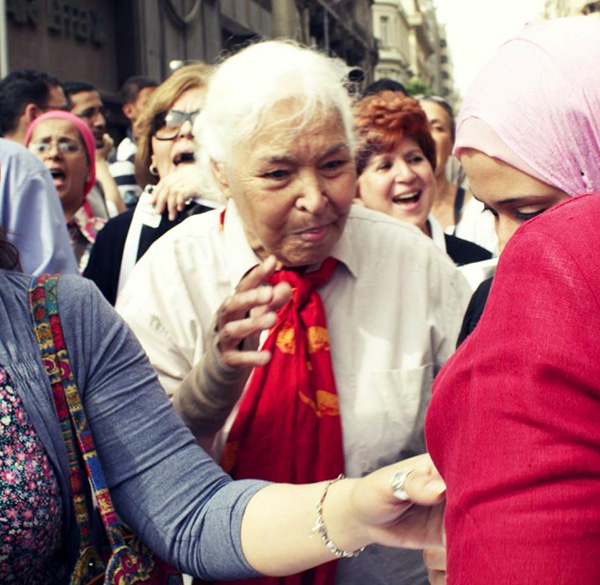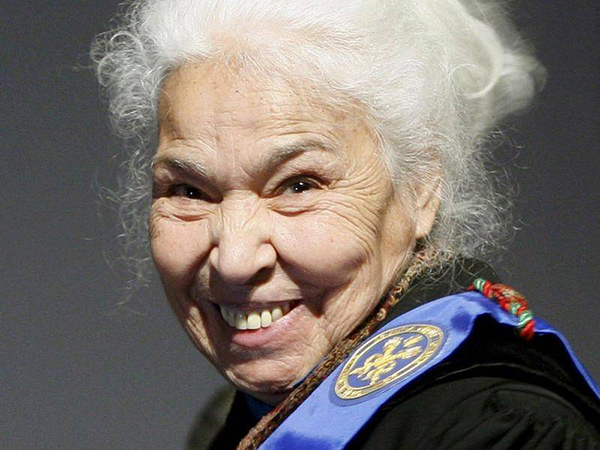On Nawal El Saadawi: Writer and lifelong fighter against women’s oppression, 1931-2021
| revcom.us
They said, “You are a savage and dangerous woman.” I am speaking the truth.
And the truth is savage and dangerous.
—Nawal El Saadawi
Nawal El Saadawi, the beloved Egyptian writer, doctor, and women's rights champion, died on March 21 in Cairo. She brandished the truth about the oppression of women with daring, verve, and artistry. She has been hailed in tributes as “Egypt’s most radical, secularist, feminist woman” and a “pioneer of women’s liberation” in the Arab countries and worldwide. She wrote more than 50 books of fiction and nonfiction, including Woman at Point Zero, The Hidden Face of Eve, and Memoirs from the Women’s Prison. Her work has been translated into dozens of languages ... and has stirred hearts and minds.
The intellectual fearlessness that fired El Saadawi’s research and sweeping denunciations of the many forms of women’s oppression was matched by her disdain for the personal consequences, which included persecution and imprisonment by the Egyptian authorities and a life lived in the shadow of death threats from religious fanatics.
Nawal El Saadawi was born into a rural family in the agricultural region where the Nile River drains into the Mediterranean Sea. Nawal was six when she was taken from her bed in the middle of the night and thrust into a bathtub where her genitals were slashed, with her mother right beside her. Shortly afterwards, her grandmother tried to teach her “the facts of life,” telling her that “one boy was worth 15 girls.” Outraged, the seven-year-old Nawal wrote her first text, a letter to God challenging him to explain why he treated women differently than men. At a book fair in 2014, she recalled, “He never replied.... I told him, ‘if you are not fair, I’m not ready to believe in you.’”
Challenging Enslaving Tradition and Reactionary Authority
El Saadawi’s scathing exposure in The Hidden Face of Eve of the horrors of female genital mutilation caused an uproar in Egypt and around the world. Her outrage ripped through the complacency of the official Egyptian left, and caused consternation among many progressive forces worldwide, who had for far too long ignored this hideous crime, including through relativist conciliation with the “cultural practices” of the oppressed.
Nawal relentlessly campaigned against female genital mutilation. In 2008, Egypt finally passed a law outlawing the practice—yet according to UN data, about 87 percent of women and girls aged 15 to 49 in the country have been cut. The large-scale persistence of this cruel practice, even as Egypt’s women have been increasingly drawn out into the world, represents a vicious backlash, a reminder and reinforcer of women’s subordinate role in this system of male supremacy.
Yet El Saadawi did not turn inward. She became a medical doctor and started her career practicing in the poor villages near where she grew up, until she was reassigned by the medical authorities in retribution for campaigning to raise awareness among her patients.Years later she became director of public health for the Egyptian government, but was fired in 1972 after the republication of her book, Women and Sex, which denounced the sexual oppression of women.
One of her most celebrated works, Woman at Point Zero, was a fictionalized account of the life of a woman Nawal interviewed in the Cairo women’s prison just before the woman was executed for killing a man who tormented her since she was a little girl and forced her into prostitution. Nawal herself soon ended up in that same prison. In an interview with the British Broadcasting Corporation, she talked about her time there, debating with Marxists and arguing fiercely with religious fundamentalists. And with a sparkle in her eye and the defiant sense of humor that she never lost, she quipped to the interviewer, “You should go to prison—I highly advise it,” because it was such a “rich experience.” Political prisoners were forbidden to have any writing materials, so she managed to smuggle in an eyebrow pencil from a prostitute in the adjoining cell and used it to write what became Memoir from the Women’s Prison on toilet paper.
For the rest of her life she was often hounded, threatened and, as Islamic fundamentalism grew stronger in Egypt, driven in 1993 into exile in the U.S., where she taught at Duke, Harvard, Berkeley, and other universities. On her return to Egypt in 1996, she wrote a play called God Resigns at the Summit Meeting, in which all the prophets of the monotheistic religions, Judaism, Christianity and Islam, prevail on god to resign so that humanity can move forward. Al Azhar, an institution whose authority in Sunni Islam is comparable to the Vatican for Catholics, formally condemned her for apostasy, and she spent years under a hail of threats from the courts and Islamists.

Nawal El Saadawi in 2012 at Tahrir Square, Egypt, during a women's march. Photo: Gigi Ibrahim
Even while in unstinting opposition to state and religious authorities, Nawal engaged in a lifelong critical dialogue with others in feminist movements where she stood out for opposing the wearing of the hijab head scarf or more drastic forms of covering. She had no patience for the absurd and harmful notion—held by many so-called progressives and radicals—that such feudal practices were somehow positive expressions of cultural identity. She pointed out that no matter what some women might think, this garb was a mark of submission. She argued that the very idea of Islamic feminism was dangerous, because Islamists would never accept anything less than total submission. While women had “no place in heaven” in Islamic theology, she said, patriarchy was a universal feature of all human societies, no less in “the West” than the Middle East: “I am opposed both to covering women's bodies and uncovering them.”
Opposing Imperialism and Zionism; Joining the 2011 Tahrir Square Uprising
Nawal also stood out for her fierce opposition to Western colonialism and imperialism. This was so important to her that when the international Arab women's solidarity organization she had founded took a position in favor of the 1991 U.S.-led invasion of Iraq, she quit the organization in protest, and it collapsed. She argued that the social and economic structures imposed by the West and imperialist political maneuvering to use Islamists against more radical movements, as well as the West's own ugly features, were huge factors in the rise of Islamism. “After travelling all over the world... I discovered that girls are brought up in a very similar way—we are all in the same boat. The patriarchal, religious, capitalist system is universal.”
She was an outspoken critic of the 2001 U.S.-led war on Afghanistan—and a fierce opponent of the state of Israel (she described U.S. support for Israel as “real terrorism”).
This combination of opposition to patriarchy and imperialist domination made her a rare and much-beloved figure among generations of progressives and radicals. Despite her advancing age, she took to Tahrir Square in Cairo during the mass rebellion of February 2011 that toppled the viciously repressive regime of Hosni Mubarak who ruled Egypt for almost 30 years. She considered this uprising the most important event in her lifetime. She continued to wrangle over the relationship between the capitalist-imperialist system, the oppressed nations, patriarchy and women’s oppression for the rest of her life. She participated in a 2011 conference in London about the way forward for the Arab Spring, with speakers including Raymond Lotta, a follower of Bob Avakian; the radical Iranian-Kurdish scholar Amir Hassanpour; feminists; and others.
After Mubarak was toppled, an election brought the Islamic-fundamentalist Muslim Brotherhood of Egypt to power. Then in 2013 the Egyption military overthrew the Brotherhood government and installed General Abdel Fattah el-Sisi. This posed a particular challenge to Nawal. She, like most of the generation of Tahrir Square rebels, initially went along with el-Sisi’s coup, considering the military a force that would protect rights—a mistake that caused anguish among some who cherished her. A mistake that underlines the critical need to, as Bob Avakian points out in his New Year’s Statement, not be “whipped around by... what is happening on the surface at any given time, but to dig beneath the surface, to discover the underlying mainsprings and causes of things, and arrive at an understanding of the fundamental problem and the actual solution.”1
Nawal remained a fiery social critic. In a 2018 interview, she was asked if she might consider toning down her rhetoric to keep safe. Her reply was consistent with a lifetime of unrelenting rebellion: “I should be more aggressive, because the world is becoming more aggressive and we need people to speak loudly against injustices.” Hers was a literature and life of defiance and creativity in a suffocating society and culture. And as for the danger facing one who speaks out in a country like Egypt with several thousand political prisoners kept in horrific conditions, “Danger has been a part of my life ever since I picked up a pen and wrote. Nothing is more perilous than truth in a world that lies.” Nawal El Saadawi will be sorely missed.
NAWAL EL SAADAWI'S NOVELS AND OTHER WRITINGS ARE AVAILABLE AT REVOLUTION BOOKS
Consulted for this article: various writings by Nawal el-Saadawi; Wikipedia; BBC obituary; Guardian obituary; Reuters obituary; BBC's Imagine documentary series.
1. To quote the point more fully: “To understand why we are confronted with the situation we are, it is necessary not merely to respond to—and in effect be whipped around by—what is happening on the surface at any given time, but to dig beneath the surface, to discover the underlying mainsprings and causes of things, and arrive at an understanding of the fundamental problem and the actual solution. This means coming to the scientific understanding that we are living under a system, and what that system actually is (the system of capitalism-imperialism); working to grasp the deeper relations and dynamics of this system and how this is setting the framework for how different sections of society spontaneously think and react to events in society and the world, and what is the possible way forward to transforming all of this in the interests of the masses of humanity and ultimately humanity as a whole.”
For more on the relationship between patriarchy, capitalism-imperialism and religious fundamentalism, see Bob Avakian's writings, including: A New Year: The Urgent Need for a Radically New World—For the Emancipation of All Humanity; Bringing Forward Another Way; Break ALL the Chains! Bob Avakian on the Emancipation of Women and the Communist Revolution. [back]

Nawal El Saadawi
Get a free email subscription to revcom.us:

